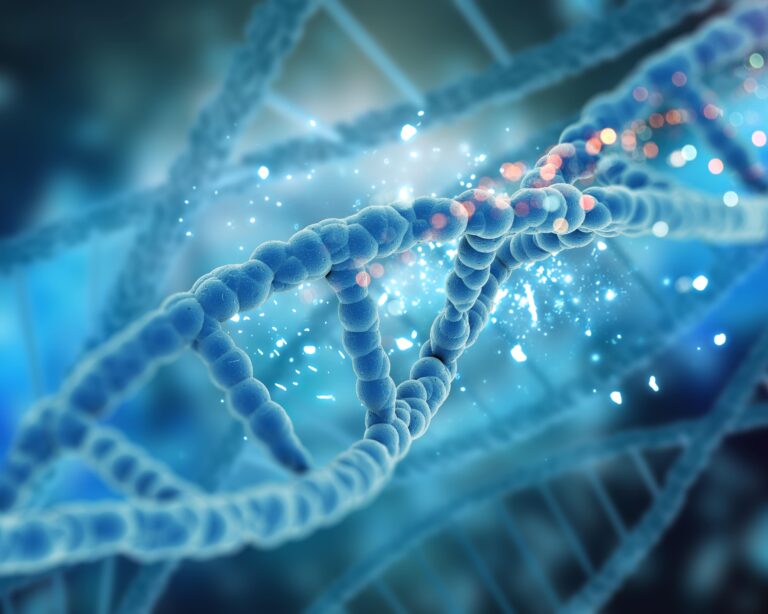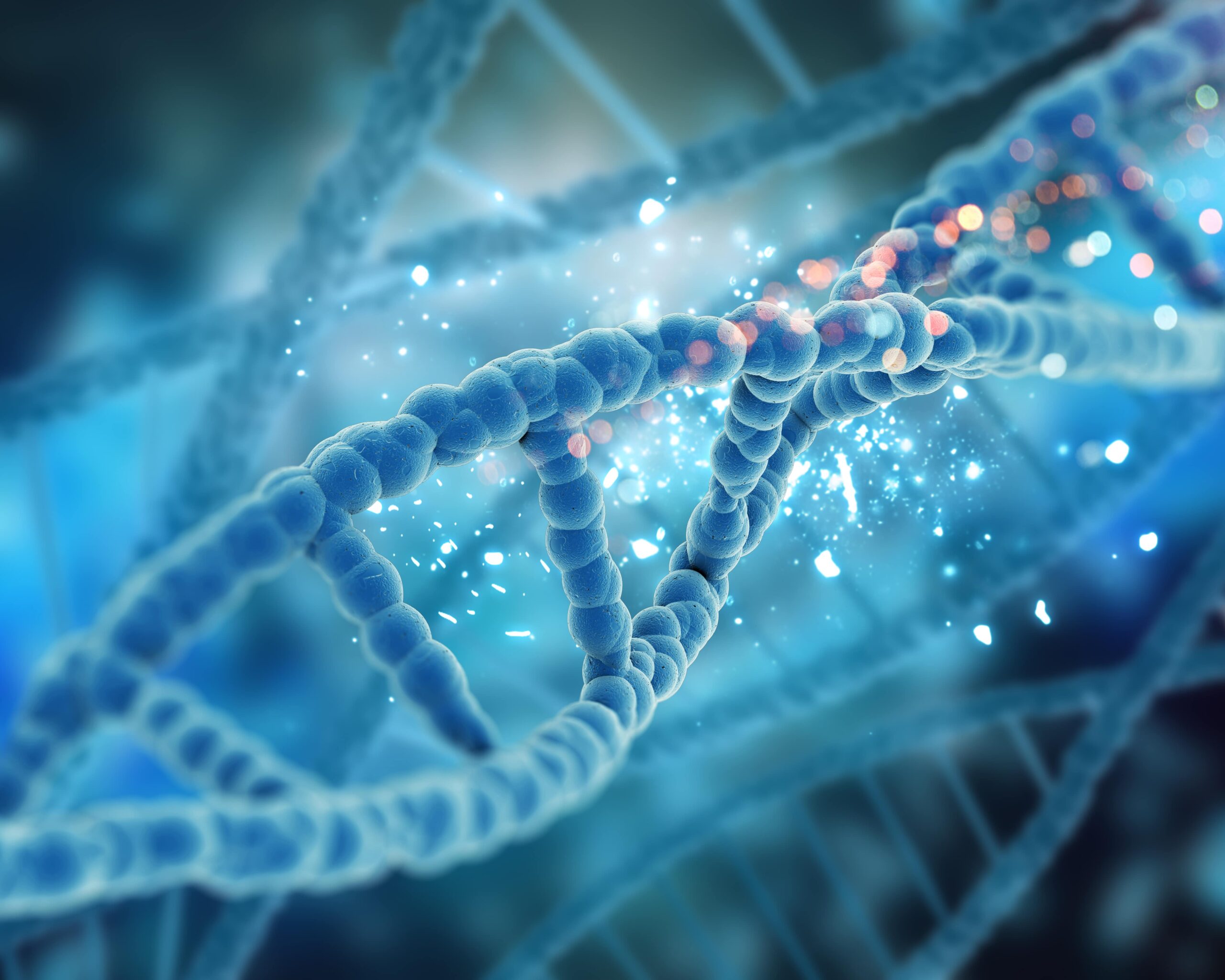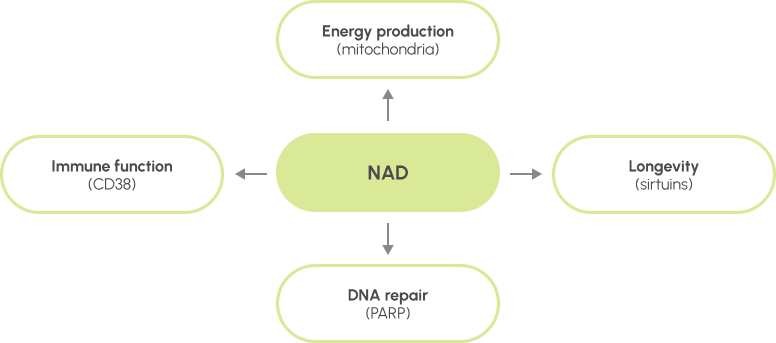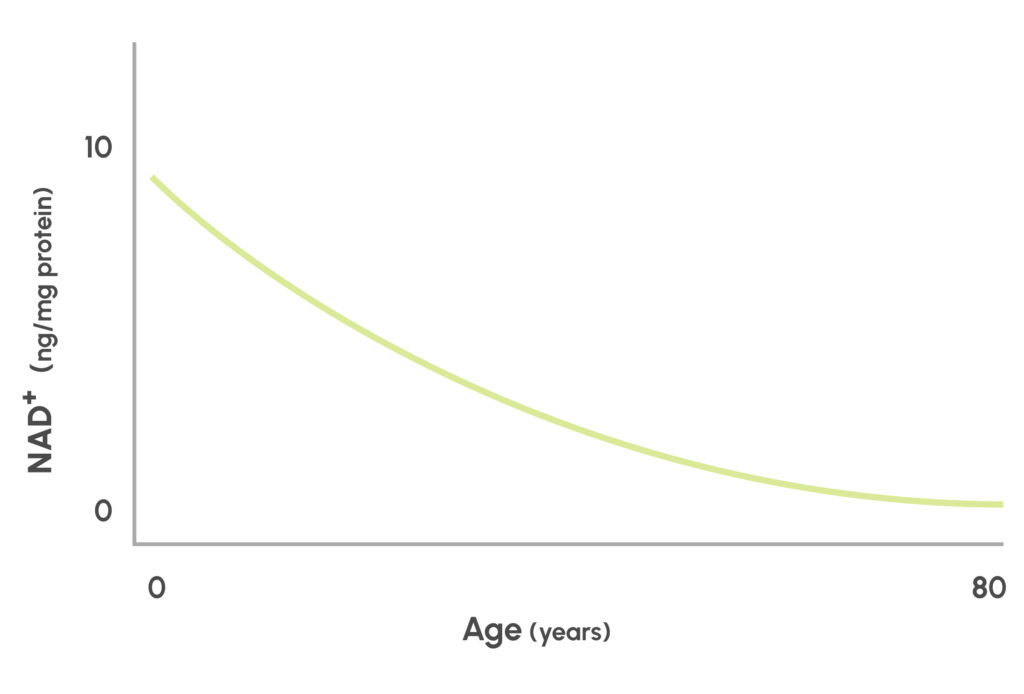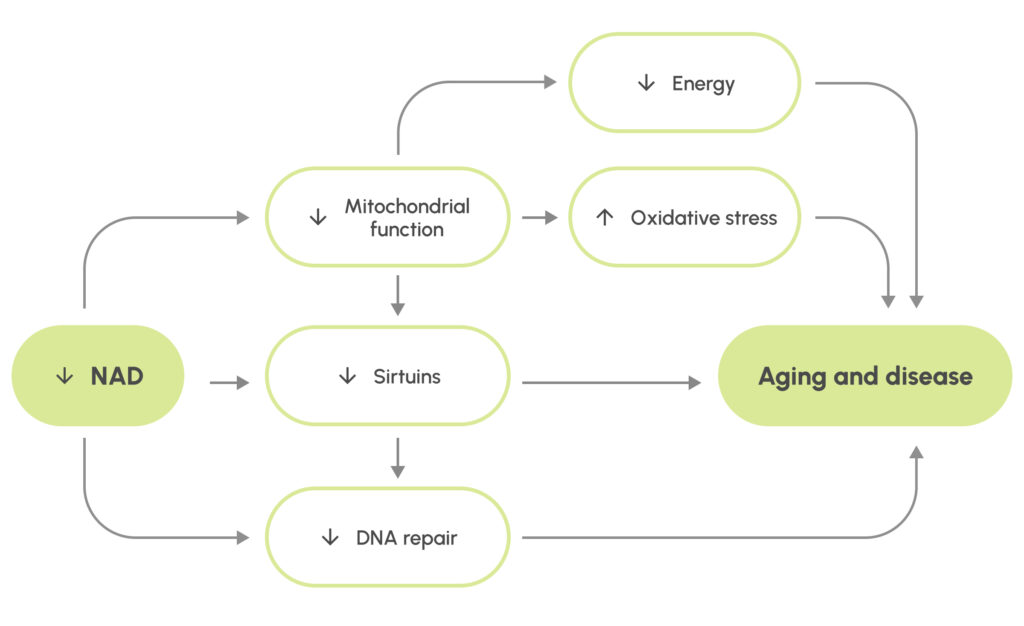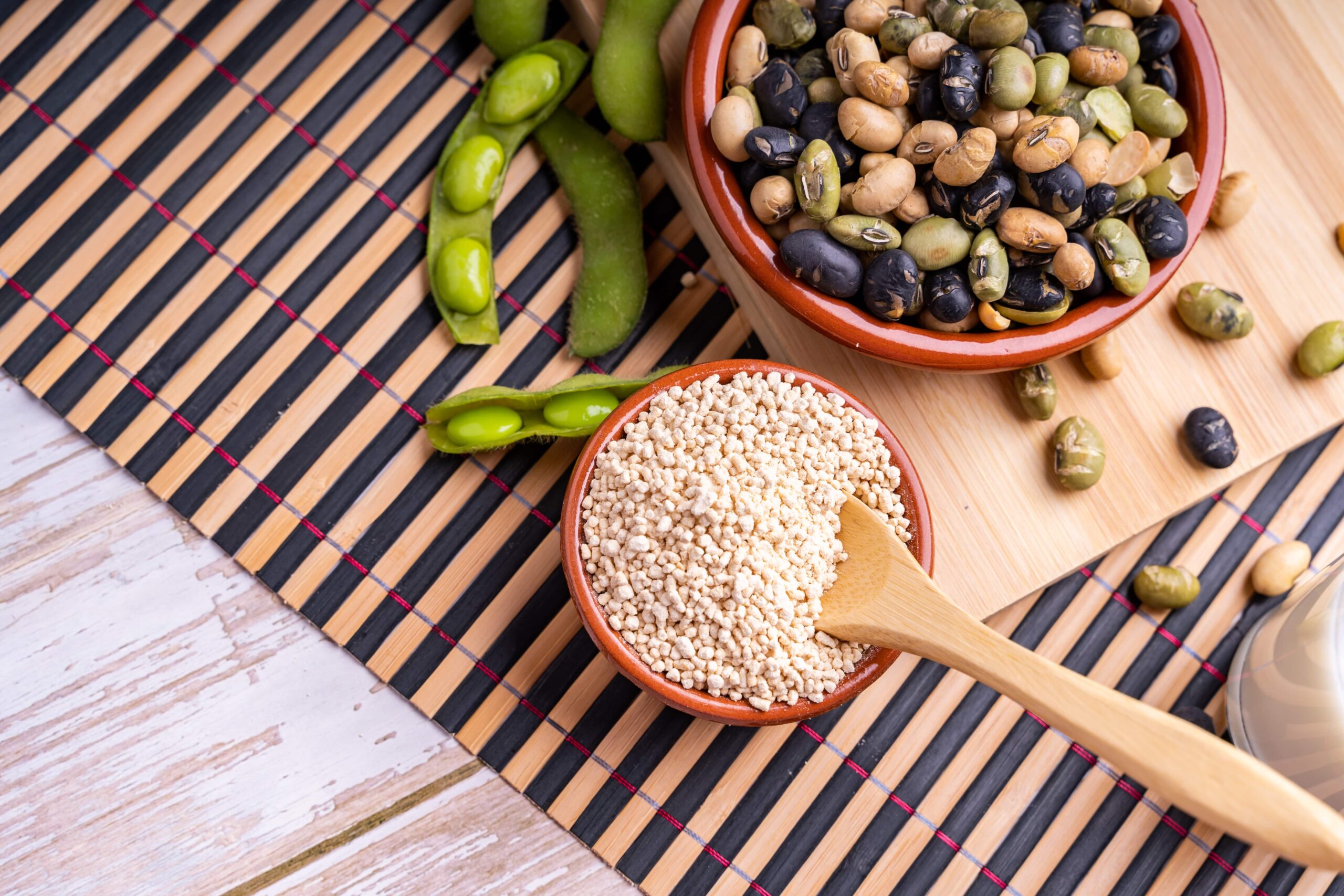NAD+ is a vital molecule in every cell, playing a significant role in energy metabolism, DNA repair, and gene expression. As we age, NAD+ levels decline, leading to age-related diseases. Boosting NAD+ levels can improve cognitive function, energy levels, and overall health. Adequate NAD+ levels help maintain optimal cellular function, reduce disease risk, and promote healthy aging.
What is NAD?
Everything happening in any life form, like breathing, moving and even thinking is based on biochemical reactions. Every biochemical reaction requires energy. Our bodies take this energy from food and mitochondria convert it into the currency that every cell can use. A protagonist in energy production is a molecule called NAD (Nicotinamide Adenine Dinucleotide). NAD is found in two forms: NAD+ (oxidized form) and NADH (reduced form). NAD+ is a co-enzyme, a molecule that helps other proteins and enzymes do their job.
What does NAD+ do?
One of NAD+ jobs is producing energy in mitochondria and reducing oxidative stress. That’s not all that it does, NAD participates in more than 50% of all biochemical reactions in our bodies. One of these processes is DNA repair, or keeping the DNA intact. With time, DNA accumulates errors, or mutations, that if left uncorrected cause diseases like cancer. NAD+ collaborates with PARP, an enzyme responsible for correcting these errors and keeping the DNA healthy.
Another group of enzymes that NAD+ activates are the sirtuins. It would be fair to call sirtuins the “proteins of longevity”, as they are well-known for promoting healthy aging and longevity. Sirtuins are instrumental for the proper function of the cells including oxidative balance and DNA repair. As a result, their high activity is necessary for good cardiovascular, cognitive, metabolic and immune function.
What happens when NAD+ levels decrease?
NAD is crucial for many core pathways in the cell. The enzymes we mentioned earlier compete for the available NAD+. If somehow all NAD+ in our bodies ran out, we would not survive for more than a few seconds. The problem is that NAD+ levels drop with age. This is because the demand for it increases and its biosynthesis decreases. This reduction in NAD+ levels leads to a drop in mitochondrial function, sirtuins activity and DNA repair. This leads to an increase in oxidative stress and systemic malfunction, also known as aging. Consequently, low NAD+ activity is related to a higher risk of heart disease, Type 2 diabetes, Alzheimer’s disease and accelerated aging.
NAD+ levels decrease with age as measured on human skin samples. Image Source.
The drop of NAD leads to decrease in mitochondrial function, sirtuin activity and DNA repair, ultimately leading to aging and disease. Aging and disease further reduce the levels of NAD creating a vicious cycle.
What causes NAD+ decrease?
A major cause of NAD+ decrease is aging and increased demand for NAD+, which causes its levels to decrease in many tissues, including the liver, skeletal muscles, and brain. As a result of decrease, mitochondrial dysfunction, oxidative stress, and inflammation are thought to contribute to age-related health problems, as described in the image above – it creates vicious cycle. Let’s explore what else leads to decrease in NAD+ levels:
- Increase in CD38 activity
As described previously CD38 plays a critical role in immune function. Nevertheless, CD38-mediated NAD+ consumption can influence its cellular levels, which affects immunity and overall health.
- UV Radiation
radiation exposure, and they use NAD+ to repair damaged DNA. NAD+ is consumed during this process, and this consumption then leads to the decrease of its levels in cells.
- Environmental Toxins
Various studies confirms that exposure to environmental toxins such as pesticides and heavy metals can have negative effect on NAD+ levels in the body through increased oxidative stress, inflammation, and DNA damage.
- Metabolic Stress
The metabolic stress caused by obesity, diabetes, and cardiovascular disease may reduce NAD+ levels through a variety of mechanisms, including inflammation and oxidative stress.
- Poor Diet
Eating habits high in processed foods, high in calories and low in essential nutrients such as vitamins B3 and B6 can contribute to decrease in NAD+ levels.
- Alcohol Consumption
Excess alcohol consumption in general is unhealthy and can lead to liver damage and increase oxidative stress and as we know increased oxidative stress causes reduced NAD+ levels.
- Lack of Exercise
According to recent research – regular aerobic and resistance exercise has been shown to increase NAD+ levels in various tissues, while sedentary behavior at the same time may contribute to NAD+ decline.
How to increase NAD+ levels?
Now that we have a clear understanding of what NAD+ is, we know that it is declining with age, we understand the root causes of it – let’s take a look at a most important topic – how can we increase NAD+ levels in our bodies. Here are some actions that could contribute to this effort:
- Calorie Restriction & Fasting
Calorie restriction & Fasting has been shown to increase NAD+ levels by activating sirtuins in various tissues. Sirtuins regulate cellular processes such as DNA repair and metabolism. They require NAD+ as a cofactor to function, so as NAD+ levels increase, sirtuin activity is also enhanced. This, in turn, can lead to increased cellular energy production and improved overall health.
- Regular Exercise
Regular exercise has many health benefits including cellular health. As mentioned previously sedentary behaviour has a negative impact and regular aerobic and resistance training increase NAD+ levels. Exercise can activate AMP-activated protein kinase (AMPK), a metabolic regulator that can increase NAD+ levels. AMPK activation increases the activity of enzymes that produce NAD+ and decreases the activity of enzymes that consumes it.
- Avoiding NAD+ Reducing Factors
As described previously: UV radiation, environmental toxins, and metabolic stress reduces NAD+ levels. If our target is to maintain levels of this molecule it is clear that it can also be achieved by avoiding mentioned negative factors.
- NAD+ Precursors
NAD+ precursors like nicotinamide riboside (NR) and nicotinamide mononucleotide (NMN) can also be used to boost levels of NAD+. Animal and human studies have shown that these supplements do increase levels of NAD+ in various tissues.
Benefits of NAD+ Precursors
Let’s dive a little bit deeper to NAD+ precursors. Most popular at the moment are nicotinamide riboside (NR) and nicotinamide mononucleotide (NMN), they have gained popularity in longevity field and a lot of public attention and scientific research due to their ability to effectively increase NAD+ levels in cells.
But do both supplements are equally effective? Recent studies suggest that NMN has some advantages over NR when it comes to increasing NAD+ levels.
First of all, NMN is a more direct precursor to NAD+ than NR, meaning it requires fewer enzyme steps to convert to NAD+, leading to faster and more efficient increase in NAD+ levels in cells.
Advantage of NMN is also supported by various studies that have demonstrated that NMN has a greater impact on health outcomes than NR. In mice, for example, NMN supplementation improved glucose tolerance, insulin sensitivity, mitochondrial function, and exercise capacity. These results have been attributed to NMN’s ability in sirtuin activation.
NMN has also been shown to be safe and well tolerated in humans, with no serious adverse effects reported in clinical trials. It could be concluded that NMN has advantages over NR in terms of direct conversion to NAD+, superior efficacy, and significant health benefits.
Final thoughts
As a critical molecule in our bodies, NAD+ is crucial for sirtuin activation, maintaining energy metabolism, DNA repair and immune function. Nevertheless, NAD+ levels decrease with age, resulting in a variety of age-related diseases.
Fortunately, there are various ways backed by science to increase NAD+ levels, such as taking NAD+ precursors like NMN, and lifestyle changes like exercise, fasting and healthy diet.
Researchers are continuing exploring other ways to boost NAD+ levels, such as NAD+ gene therapy, so the future of it looks promising. As we continue to unravel the complex mechanisms of NAD+ and its roles in cellular function, we may discover new ways to combat age-related diseases and enhance human health. Let’s stay positive and hopeful.
Read more
Explore how Apigenin can enhance sleep quality and promote healthy aging with its wide range of health benefits. Integrate Apigenin into your Sleep Cocktail to enjoy deeper, more restful sleep and support your overall well-being.
Vitamins do not possess the ability to stop the natural aging process, they can undoubtedly play a crucial role in supporting healthy aging or even slowing it down. So, when considering what should be included in your anti-aging strategy – vitamins cannot be missed.
Is it possible to get enough NMN from natural food sources to increase NAD+ levels. To answer this question we will review different types of food with the highest amount of NMN: Edamame, Avocado and Broccoli.
